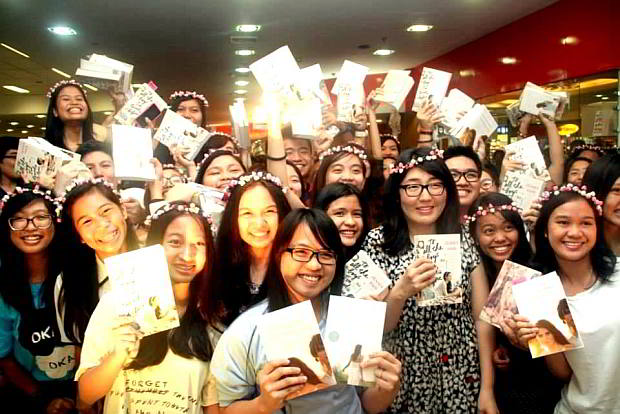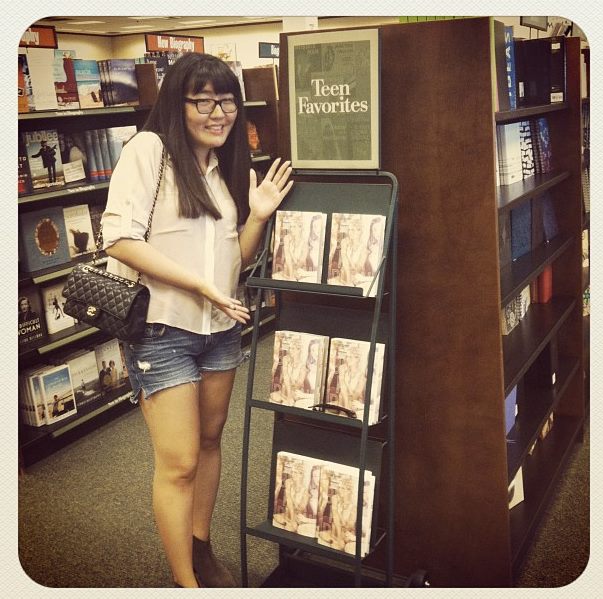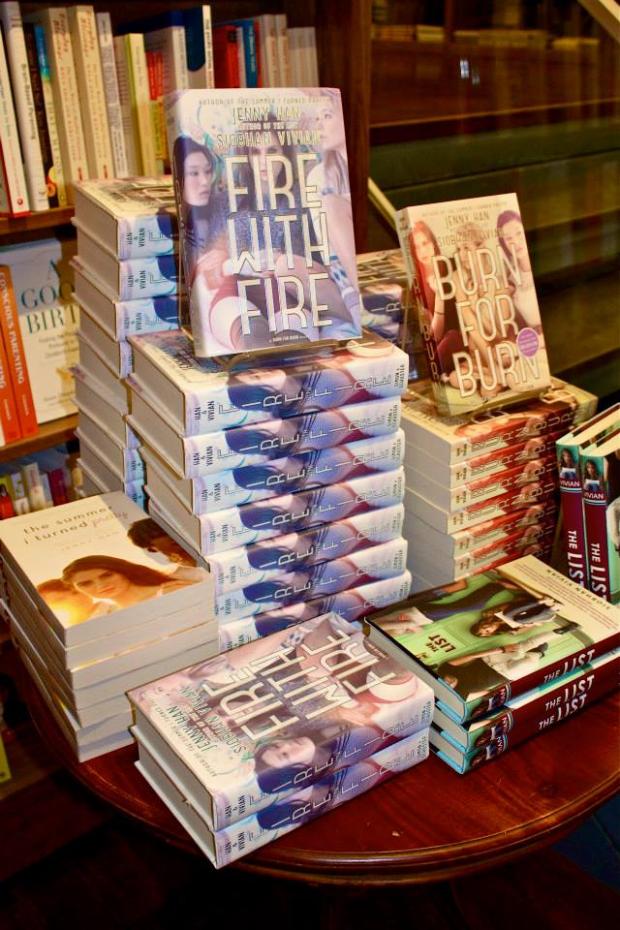 She’s one of the most acclaimed young-adult (YA) fiction writers. Someone teenagers and professionals would line up for. A New York Times best-selling author and sucker for baking. For the author of “The Summer I Turned Pretty” trilogy, Jenny Han, a good story weaves experience and imagination. The story of Belly with Conrad and Jeremiah in her series continued in “It’s Not Summer Without You” and ended in “We’ll Always Have Summer.” Jenny thinks good writing seizes a period of time and taps the reader’s mind as though he or she is physically there.
She’s one of the most acclaimed young-adult (YA) fiction writers. Someone teenagers and professionals would line up for. A New York Times best-selling author and sucker for baking. For the author of “The Summer I Turned Pretty” trilogy, Jenny Han, a good story weaves experience and imagination. The story of Belly with Conrad and Jeremiah in her series continued in “It’s Not Summer Without You” and ended in “We’ll Always Have Summer.” Jenny thinks good writing seizes a period of time and taps the reader’s mind as though he or she is physically there.
National Book Store recently brought Jenny to Manila and Cebu for a book signing tour to promote her latest book “To All the Boys I’ve Loved Before”. She, yet again, drew a vivid picture of the thrills and dilemma of young love. Kirkus Reviews describes the book as “An ultimately compelling exploration of teenage growth and love.” Also, she co-authored “Burn for Burn” and “Fire with Fire” with Siobhan Vivian.
Here, the Korean-American author shares unforgettable experiences and insights with the Play! pool. Jenny exuded radiance like a bright ray of sunshine amid the gloom of the weather on that day.
Who were your creative influences growing up?
I looked up to Judy Blume, Stephen King, Margaret Mitchell, Pat Conroy. When I was writing, there wasn’t much young-adult literature available. You kind of went straight from baby literature’s club to Stephen King. It was like that, you know. You were like nine or ten. There wasn’t much in the middle, so most kids I know were reading like V.C. Andrews like “Flowers in the Attic”… that kind of stuff.
Is this why you picked this genre?
Yeah! I went to graduate school in New York for Writing for Children, and so children’s literature is like my passion. I wanted to be very specific in what I wanted to do so I went for young adult books.
Why Young Adult?
I’m just really interested in that period of a person’s life. It is a time of discovery, a time for firsts. It’s the time you don’t really forget and everyone has to go through that. Adolescence. It’s naturally very compelling. There’s a lot of stories in that time. People remember that very clearly, being a teenager.
What were your teen years like?
I was very involved in hurch. I was a sort of nerdy high school girl.
I was reading a lot. I was involved in an Asian-American group in school. I grew up in Richmond, Virginia. It’s not that big of a city, not that diverse. I was reading a lot and baking a lot. That’s why in my book “To All the Boys I’ve Loved Before,” there’s a lot of baking going on (Laughs). I find it to be a stress reliever.
How would you describe your writing style.
I guess my style is kind of warm. I tend to write stuff that is warm and innocent. Hopefully, it feels fresh. I think my readers would answer that question better. (Laughs). Also, I don’t like to push a moral in a story. I tell the story and let people pull whatever they can from it.
Do you find writing in the first person point of view easier or more effective?
I really love first person ever since I was a kid. Whenever I saw a book, I was like, is it first person or third person? I was always drawn to first person and I think because it’s just a lot more intimate. You’re instantly in that character’s head. You’re just with them. There’s no distance between you. Very intimate.
Is there a particular book that influenced you the most when you were in the process of becoming a writer?
“How to Kill a Mocking Bird” by Harper Lee. It’s an adult book but it’s a young voice. It really impressed upon me that this young narrator doesn’t mean the story has no depth and beauty. It’s so compelling. It’s like most people’s favorite book. It drew me to that age of “a young voice. The innocence of that.
What was your reaction when you first saw your books displayed in a bookstore?
I was fairly young when I sold the book. I was 24. The book came out when I was 25. That was “Shug,” my first book. It was definitely a dream come true. It sounds cliché, but it was. I didn’t expect it to happen so fast.
Did you expect your book “The Summer I Turned Pretty” to be huge success?
Not at all! It was really a wonderful surprise. I mean, I was hoping it would find the audience, but you’ll never know what’s going to connect with people. It’s hard to say what people are drawn to. You never know what hits.
How do you come up with the plot for the “Summer” series?
It’s personal. The emotions are drawn out from my own life, but it’s pretty much from my imagination, too.
What was it like when the series had to come to an end?
In the “Summer” series, I feel like people still e-mail me for Jeremiah’s story. They want more. I think Jeremiah is already in a good place. He’s fine. Don’t worry about him! (Laughs). It was just as hard for me. I was sad as I finished it. I was crying in the end scenes. I had spent more than five years when the series ended. When you say goodbye to the characters, it’s really a goodbye because it’s hard to kind of go back.
Do you do research when you write your books?
Not that much. Oh, for “Burn for Burn” which is the trilogy I co-wrote with friend Siobhan Vivian, we went to Martha’s Vineyard a lot which is like a beach island near Boston in the States. We were both really fascinated by the idea of an island where there are no bridges. You have to fly or you to take a boat to get there. There’s a high school there, kids living on the island. It was just so fascinating for us to be stuck there all winter. In the winter time, it’s almost empty. In the summer time it swells up to, I think, a hundred times its size. The kids who went to school there are just stuck with each other. I mean, you could meet other people from other schools but this is different. You’re just there. It’s actually also kind of spooky, I think. So the book is darker than my other stuff and it’s a little bit spooky about that feeling of being trapped someplace. The third book, “Ashes to Ashes,” comes out this Fall.
How different is it to write a book on your own from having somebody to write with?
It’s great (co-writing). In some ways it goes faster because you’re writing half of the book. In some ways, it goes slower because we were sitting there going over a word choice. It’s great because you have somebody who is equally invested in the story. We’re best friends and we do weekend trips together and go talk about the book and write the book. If we’re like having dinner, we talk about other stuff like her kid or her husband or my apartment, and we can go, “Oh, hey, for that scene, we should do this … “ and then we talk about that for an hour. It’s like going in and out of business and it felt fun though because we both care too much about the characters.
When did you decide to do a book together?
We met in graduate school in New York. We both studied the same program, Master in Fine Arts in Writing for Children. We met in David Levithan class. He’s also a YA (Young Adult) writer and we just became really close. We started meeting each other during the week to write together. You just have that accountability of knowing you have somebody waiting at the coffee shop at 2 p.m. otherwise, you may not work that day! Then we started giving each other notes and feedback on each other’s stuff so we trade pages on Mondays. As I was doing “The Summer I Turned Pretty,” she read all of my pages and was giving me feedback. We just really trusted each other. A day came when her boyfriend, now already her husband, wanted to move to Pittsburgh where he’s from. We lived around the corner from each other but now she’s moving. We wanted to find a way to be still close in each other’s lives so we set a book together. We have a good excuse to see other and hang out! (laughs).
What’s the best thing about being a novelist?
The best thing is getting to dream up different kinds of lives and spend time with those characters. It’s like playing make-believe. The characters slowly become very real to me as I’m writing the story so I kind of get lost in that. The experience of being a reader and picking up a book and reading it, and then being transported somewhere else and feeling that you’re in someone else’s story. Your body is here but your mind is still in the story. The writer sort of feels that too at some point. You won’t even know what time it is because you’re in it. It’s once in a while when that happens, when you’re not fussing with the words. Sometimes it can be very tough. It feels like you’re trying to draw blood from a stone. And sometimes you just catch that wave and you just write it. And then the next day, it’s a whole new struggle to write. But on the good days, it feels amazing.
Is there a day when you think you should have written it a different way after a book is out?
Not really because when you’re done, you’re done. You have to move on to the next thing. You can’t dwell on whatever it was. Well, publishers now are sort of re-releasing what was like 20 years ago and they update it with modern technology and stuff. A part of me feels sad about that because in a book you can capture a moment, a moment in time of culture, too. And when you change a typewriter to a computer in the story so that kids nowadays will get it, you lose that real picture—that snapshot of what that moment was when the story was written.
What’s your favorite time of the day?
I like noon or early afternoon because it feels like you still have the rest of the day ahead of you to do work or something. You can be hopeful of what’s going to happen. It’s a very hopeful time. I don’t eat right away. I feel sick if I eat too fast. So I do e-mails and then go to a café around noon to write and eat lunch since it’s hard for me to work at home and get it done.

Jenny with her fans at National Book Store’s meet-and-greet/ book signing event. (CDN PHOTO/ EDD BUENAVIAJE)
What’s your take on books being turned into films?
It’s really the No. 1 question in the e-mails I get from fans. Can you make a movie? Can you make a TV show? I don’t have any power over that. When you sell it , that’s an option. It’s a very long road and rarely anything gets me. The stuff that gets me, I think people end up often getting really disappointed. That’s the way that turns out. Always. I can count the people on one hand how many movies I’ve seen based on a book that I thought was an amazing representation. Everything in your head is always better than what you’ve seen on screen. Not every book, I think, is meant to be a movie.
What about your books?
I would love it, yes! You obviously get a much bigger audience. Not everyone reads and so they’d say, “Oh, I want to check out the book,” because it’s almost a two-hour commercial for your book. I think you have to, as a writer, separate yourself from it. That’s their movie. This is my book and it’s not going to be the same. And it shouldn’t be. It becomes someone else’s artistic vision of what the story is.
How has your Philippine tour been so far?
It’s been great! Everyone on the team has been so nice to me and taking such good care of me. It’s been fun to hang out and meet fans. Oh my God! I woke up in the night over and over again because I have pains right here in my face from smiling! I can’t even smile too much right now! (laughs). Some people had to come out at 11 p.m. the night before to be the first in line. There were four girls who came so they could be first in line for the 10 a.m. registration. Some came at 3 a.m. so we had really cute presents for them.
What can your fans look forward to in the coming months?
I’m working on a sequel of “To All the Boys I’ve Loved Before” which is “P.S. I Love You.”


